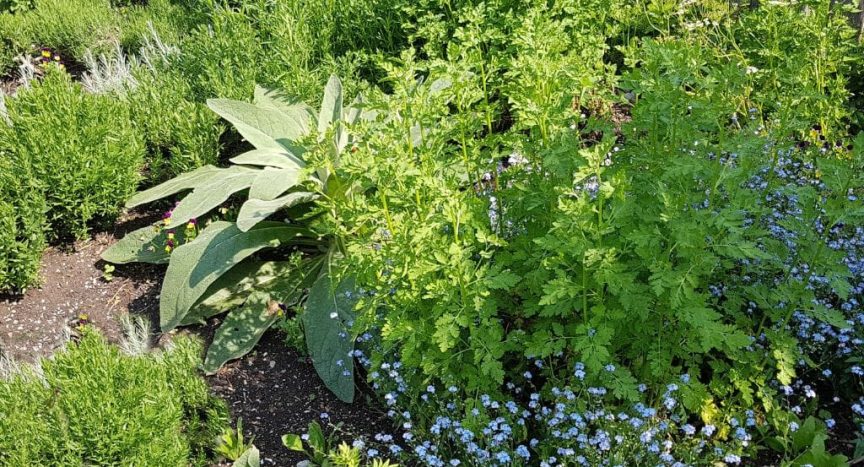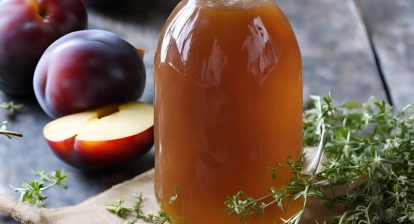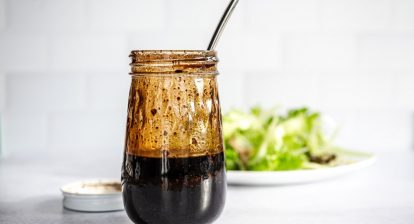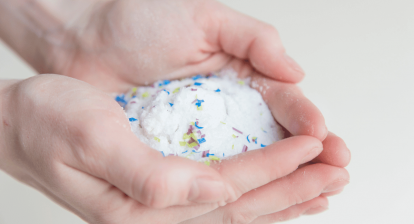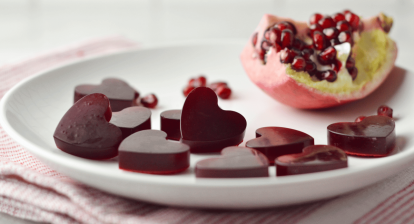These herbs can be used for herbal teas, each offering its own unique blend of health benefits.
When making tea, it is essential to use the correct parts of each plant, as indicated, to ensure safety and effectiveness.
For example, using Anise Hyssop leaves and flowers for its digestive and respiratory benefits, or Angelica roots and seeds for digestive support.
The contribution of each herb, from the soothing qualities of chamomile flowers to the liver support of dandelion leaves, roots and flowers, enriches the diversity and healing potential of the tea garden.
Here are some herbs to consider in your medicinal tea garden along with the parts used and their healing benefits:
-
Anise Hyssop (Agastache foeniculum)
- Part used: Leaves, Flowers
- Benefits: Aids digestion, relieves respiratory congestion, and has a soothing, licorice-like aroma.
-
Angelica (Angelica archangelica)
- Part used: Roots, Seeds
- Benefits: Known to support digestion, can help relieve gas and bloating, and is used in traditional medicine for respiratory health.
-
Bee balm (Monarda didyma)
- Part used: Leaves, Flowers
- Benefits: Soothes digestive problems, has antiseptic properties and can relieve cold and flu symptoms.
-
Borage (Borago officinalis)
- Part used: Leaves, Flowers
- Benefits: Known to support the kidneys, it can improve mood and the leaves have a cucumber-like aroma, useful in teas and salads.
-
Calendula (Calendula officinalis)
- Part used: Flowers
- Benefits: Supports skin health, promotes wound healing and has anti-inflammatory properties.
-
Catnip (Nepeta cataria)
- Part used: Leaves, Flowers
- Benefits: Eases digestive upset, can reduce anxiety and help with sleep, and is also known for its mild sedative effects.
-
camomile (Matricaria recutita)
- Part used: Flowers
- Benefits: Calms the nervous system, aids digestion and is widely used for its soothing and anti-inflammatory properties.
-
Chervil (Anthriscus cerefolium)
- Part used: Leaves
- Benefits: Provides gentle digestive support, may help lower blood pressure, and has a mild anise-like aroma.
-
Cone flower (Echinacea spp.)
- Part used: Roots, leaves, flowers
- Benefits: Boosts the immune system, can reduce cold and flu symptoms, and has anti-inflammatory properties.
-
Dandelion (Taraxacum officinale)
- Part used: Leaves, Root, Flowers
- Benefits: Supports liver health, aids digestion and is rich in vitamins and minerals.
-
Elderberry (Canadian Elder)
- Part used: Berries, Flowers
- Benefits: Increases immunity, can relieve cold and flu symptoms and is rich in antioxidants.
-
dill (common fennel)
- Part used: Bulb, leaves, seeds
- Benefits: Aids digestion, can relieve gas and bloating, and is known for its licorice-like flavor.
-
FEVER (Tanacetum parthenium)
- Part used: Leaves, Flowers
- Benefits: May reduce the frequency of migraines and relieve arthritis pain, with anti-inflammatory properties.
-
Ginger (Zingiber officinale)
- Part used: Root
- Benefits: Supports digestion, relieves nausea and has anti-inflammatory and antioxidant properties.
-
Hibiscus (Hibiscus sabdariffa)
- Part used: Flowers
- Benefits: May help lower blood pressure, supports liver health and is rich in antioxidants.
-
Holy Basil (Tulsi) (thin-flowered basil)
- Part used: Leaves, Flowers
- Benefits: Reduces stress and anxiety, supports the immune system and has adaptogenic properties.
-
Horehound (Marrubium vulgare)
- Part used: Leaves, Flowers
- Benefits: Traditionally used for respiratory health, can soothe sore throats and coughs.
-
Joe Pye Weed (Eutrochium purple)
- Part used: Leaves, Roots
- Benefits: Supports kidney function and urinary health, can help with joint and muscle pain.
-
lavender (Lavender spp.)
- Part used: Flowers
- Benefits: Soothing and relaxing, it can help ease sleep and stress, and is also known for its skin-soothing properties.
-
Lemon balm (Melissa officinalis)
- Part used: Leaves
- Benefits: Relieves stress and anxiety, supports digestion and has a mild sedative effect to aid sleep.
-
Lemon grass (Cymbopogon citratus)
- Part used: Stem, Leaves
- Benefits: Aids digestion, can help relieve anxiety and insomnia, and has antimicrobial properties.
-
Verbena with lemon (Aloysia citrodora)
- Part Used: Leaves and flowering tops
- Benefits: Soothes digestive problems, can reduce inflammation and has a refreshing lemon scent.
-
Marshmallow (Althaea officinalis)
- Part used: Roots, Leaves, Flowers
- Benefits: Soothes irritated mucous membranes, supports skin and digestive health, and has anti-inflammatory properties.
-
Milk thistle (Silybum marianum)
- Part used: Seeds
- Benefits: Supports liver health, has antioxidant and anti-inflammatory properties, and can aid in detoxification.
-
Peppermint or spearmint (Mentha spp.)
- Part used: Leaves
- Benefits: Aids digestion, can relieve IBS symptoms and is known for its refreshing scent.
-
Motherwort (Leonurus cardiaca)
- Part used: Leaves, Flowers
- Benefits: Supports heart health, can relieve stress and anxiety, and is traditionally used for women's health issues.
-
Mugwort (Artemisia vulgaris)
- Part used: Leaves, Roots
- Benefits: Promotes digestive health, can aid in dream work and menstrual health, and has mild sedative properties.
-
mullein (Tap with the verb)
- Part used: Leaves, Flowers
- Benefits: Supports respiratory health, can soothe irritated mucous membranes and is used in traditional cough remedies.
-
Oatstraw (Avena sativa)
- Part used: Straw (Stem), Seed
- Benefits: Nourishes the nervous system, supports heart health and is rich in vitamins and minerals.
-
Pineapple sage (Salvia elegans)
- Part used: Leaves, Flowers
- Benefits: It can help with digestion and ease anxiety, and its fruity aroma is a nice addition to teas.
- Plantain (Plantago major)
- Part used: Leaves, Flowers
- Benefits: It can help with digestion and ease anxiety, and its fruity aroma is a nice addition to teas.
-
Raspberries (Rubus idaeus)
- Part used: Leaves
- Benefits: Supports women's health, especially during pregnancy, and is known for its nutrient-rich profile.
-
pink (Rosa spp.)
- Part used: Petals, Hips
- Benefits: Rich in vitamin C, it supports skin health and can improve mood with its uplifting scent.
-
Rosemary (Rosmarinus officinalis)
- Part used: Leaves
- Benefits: Improves memory and concentration, supports digestion and has antimicrobial properties.
-
repair itself (Prunella vulgaris)
- Part used: Leaves, Flowers
- Benefits: Traditionally used for inflammatory bowel disease (Crohn's disease and ulcerative colitis), diarrhea, abdominal pain, and stomach irritation and irritation (gastroenteritis). It is also used for mouth and throat ulcers, sore throats and internal bleeding.
-
Stevia (Stevia rebaudiana)
- Part used: Leaves
- Benefits: Natural sweetener without raising glucose, can help manage blood sugar levels.
-
Stinging nettle (Nettle Dioica)
- Part used: Leaves, Roots
- Benefits: Rich in nutrients, supports joint health and can relieve allergy symptoms.
-
Thyme (Thymus vulgaris)
- Part used: Leaves
- Benefits: Supports respiratory health, has antimicrobial properties and can aid digestion.
-
Valerian (Valeriana officinalis)
- Part used: Roots
- Benefits: Promotes relaxation and sleep, can reduce anxiety and is known for its sedative properties.
-
Viola (Viola spp.)
- Part used: Flowers, Leaves
- Benefits: Anti-inflammatory, supports respiratory health and can soothe skin conditions.
-
Yarrow (Achillea millefolium)
- Part used: Leaves, Flowers
- Benefits: Promotes wound healing, supports digestive health and can reduce fever.
Disclaimer – It is important to note, however, that while these herbs are generally considered safe for consumption, individual sensitivities, allergies, and specific health conditions may affect their suitability. It's always a good idea to do a little research on each herb, especially if you have specific health concerns, and to consult a health care professional if you're unsure about adding a new herb to your diet. Furthermore, proper identification and knowledge of each herb is essential to avoid any negative effects, especially with herbs such as Mugwort and Valerian, which have powerful properties and should be used with caution.

